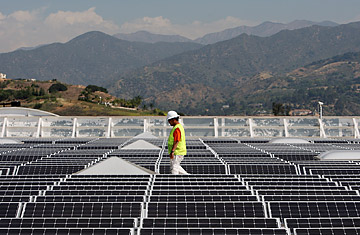
Solar panels cover the roof of a store in Glendora, Calif.
(2 of 2)
Unsurprisingly, the supporters of Prop 23 don't see it that way. To them, California's economy is far too weak to justify a pioneering law on climate change that might raise energy prices and — according to advocates — cost more than a million jobs. (Which is probably why they've termed it the California Jobs Initiative, while opponents of Prop 23 call it the Dirty Energy Proposition.) "The regulatory environment in California [already] makes it the worst place to do business," said James Duran, the founder of a California human-resources company, at a recent debate on Prop 23. "Local businesses are going away to Nevada and Asia because of the additional costs they are being subject to."
It's the same argument that opponents of a national cap-and-trade bill made in the Senate this year: it's too costly for a country just emerging from a recession. It's not surprising, then, that fossil-fuel companies are spending millions to support Prop 23, just as they fought to kill national cap and trade. Kansas-based Koch Industries and Texas-based oil refiners Valero and Tesoro have contributed nearly $10 million to the cause. And the fact that most of the money for Prop 23 has come from oil companies from outside the state hasn't escaped the notice of Californians. "Valero and Tesoro want to stop the movement from old energy to new energy because it means lost market share," said Schwarzenegger, who has pinned his legacy on his climate actions. "Does anybody really believe that these companies, out of the goodness of their black oil hearts, are spending millions and millions of dollars to save jobs?"
It's a little unfair to accuse Valero and Tesoro of being antigreen carpetbaggers — both companies operate refineries in California and employ thousands of workers in the state. But what's really interesting about the Prop 23 battle is that it reverses the narrative found elsewhere in the midterms season. The No on Prop 23 campaign has received more than $30 million in donations, more than three times what its opponents have raised. That money has come from a mix of sources. Steyer — a longtime environmentalist — himself has given $5 million, while the National Wildlife Federation and other conservation groups have collectively donated around the same amount. Greenish celebrities have gotten in on the action — Hollywood director James Cameron, a longtime environmentalist, has given $1 million, and other stars have donated their time in robocalls and TV spots.
But around a third of the money against Prop 23 has come from high-tech titans like venture capitalists Vinod Khosla and John Doerr. While peer pressure probably plays a role — in California it is definitely not cool not to care about climate change — the tech players are essentially doing the flip side of what the oil companies are doing: spending money on politics to protect their financial interests. Nine billion dollars has been invested in the clean-technology market in the state, and, according to one estimate, half a million Californians now work in clean tech or green jobs. This isn't just about saving the trees: there is major money at stake over California's climate politics, and the "good guys" aren't shy about spending millions to get their way.
It can be a bit dispiriting to think that green forces have raised millions to defeat a ballot initiative that, even if they beat, will just maintain the status quo. California will still be a lonely outlier, and environmentalists will have to grapple with the fact that there continues to be no strong national policy on energy and climate — and depending on how the midterms go, that might not change for a long time. But the fight against Prop 23 could represent a rallying point for greens. "If we defeat Prop 23, we will build a stronger coalition going ahead," says NRDC's Notthoff. "We have built a coalition that is broadly engaging and can keep pushing forward to build a clean-energy future." And they learned this lesson: it's good to have the rich people on your side.
